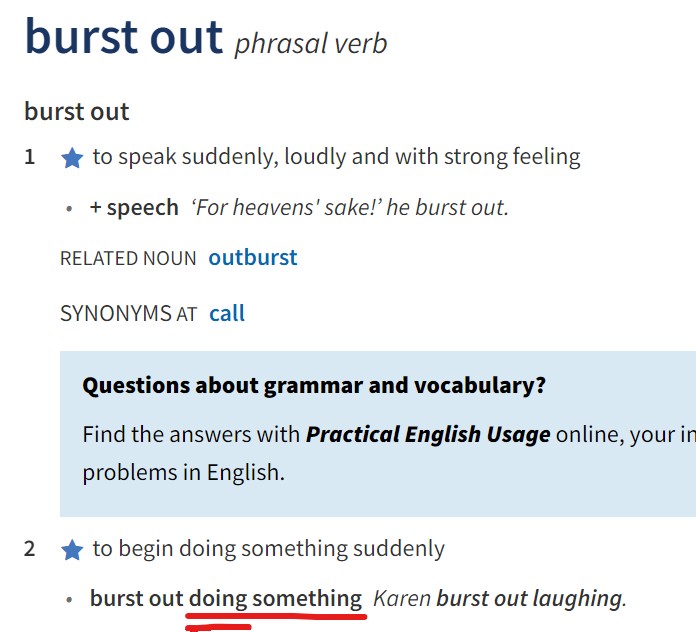“介词后面都可以跟动名词”的说法是错误的。
burst into 后面为何不能跟动名词
3 个回答
介词后面的动词必须加ing变成动名词(doing),不代表/不等于所有介词都可以接动词-ing(动名词),大部分介词后面都可以接动名词(doing)作宾语,但是语法规则下也有例外,因为有少数介词后面要接(带to或者不带to)不定式作宾语,不接动名词(doing)作宾语,例如except(除了),but(除了)。
【一】介词except后面既可以接带to的不定式也可以接不带to不定式作宾语。
【1】介词except前面有do的形式时,后面接不带to不定式作宾语。
I can do everything except cook. 除了做饭我什么事都会做。
He does nothing except eat all day. 他整天除了吃什么都不干。
I could do nothing except agree. 我除了同意,没有别的办法。
【2】介词except前面没有do的形式时,后面接带to不定式作宾语。
The windows were never opened except to air the room for a few minutes.
除了要通风几分钟以外,窗子是从来不开的。
【二】介词but后面既可以接带to的不定式也可以接不带to不定式作宾语。
【1】介词but前面有do的形式时,后面接不带to不定式作宾语。
He does nothing but complain. 他只是一个劲地抱怨。
My dog does everything but speak. 我的狗除了不会说话以外什么都会。
【2】介词but前面没有do的形式时,后面接带to不定式作宾语。
They desired nothing but to succeed. 他们只想成功。
I have no choice but to accept the fact. 我别无选择,只有承认事实。
【二】bust into +名词(sth)=burst out +动名词(doing) 突然做某事
【1】burst into tears=burst out crying 突然哭起来。
She burst into tears at the sad news.=She burst out crying at the sad news.
听到那不幸的消息,她放声痛哭.
She burst into tears and ran from the kitchen. =She burst out crying and ran from the kitchen.
她突然哭了,跑出了厨房。
【2】burst into laughter=burst out laughing 突然笑起来
They burst into laughter. =They burst out laughing.
他们突然大笑起来.
The whole class burst into laughter.= The whole class burst out laughing
全班突然大笑起来。
如果觉得我的回答对您有用,请随意打赏。你的支持将鼓励我继续创作!

- 2 关注
- 0 收藏,2351 浏览
- lovealoe 提出于 2022-11-08 08:18
相似问题
- 关于介词后面接动名词 1 回答
-
 《高考英语备考1号·速效编》
《高考英语备考1号·速效编》
-
 《高考英语备考1号·写作编》
《高考英语备考1号·写作编》
-
 《高中英语晨读晚记》
《高中英语晨读晚记》
-
 《高中英语错题笔记》
《高中英语错题笔记》
-
 《零起点考大学英语》
《零起点考大学英语》
-


 一家之言,仅供参考;
一家之言,仅供参考;